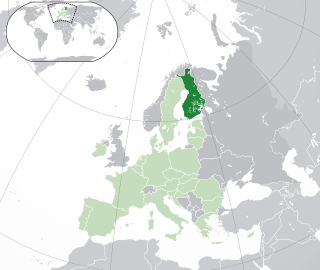
The Evangelical Lutheran Church of Finland is a national church of Finland. It is part of the Lutheran branch of Christianity. The church has a legal position as a national church in the country, along with the Orthodox Church of Finland.

Yleisradio Oy, abbreviated as Yle, translated into English as the Finnish Broadcasting Company, is Finland's national public broadcasting company, founded in 1926. It is a joint-stock company, which is 99.98% owned by the Finnish state and employs around 3,200 people in Finland. Yle shares many of its organisational characteristics with its British counterpart, the BBC, on which it was largely modelled.

The Finns Party, formerly known as the True Finns, is a right-wing populist political party in Finland. It was founded in 1995 following the dissolution of the Finnish Rural Party. The party is currently a participant in the Government of Petteri Orpo, holding seven ministerial portfolios. The party achieved its electoral breakthrough in the 2011 Finnish parliamentary election, when it won 19.1% of votes, becoming the third largest party in the Parliament of Finland. In the 2015 election the party got 17.7% of the votes, making it the parliament's second-largest political party. The party was in opposition for the first 20 years of its existence. In 2015, it joined the coalition government formed by Prime Minister Juha Sipilä. Following a 2017 split, over half of the party's MPs left the parliamentary group and were subsequently expelled from their party membership. This defector group, Blue Reform, continued to support the government coalition, while the Finns Party went into opposition. The party, having been reduced to 17 seats after the split, increased its representation to 39 seats in the 2019 Finnish parliamentary election, while Blue Reform failed to win any seats. During the 2023 Finnish parliamentary election, the Finns Party finished in second place with 46 seats, recording their strongest result since its founding. They then, out of Petteri Orpo’s request, proceeded to form a coalition government with the winning National Coalition Party, the Christian Democrats and Swedish People's Party of Finland.

Television was introduced in Finland in 1955. Color television started in 1969 and was introduced gradually, with most programs in color by the late 1970s. All terrestrial analogue stations stopped broadcasting on 1 September 2007 after the introduction of digital television; cable providers were allowed to continue analog broadcasting in their networks until 1 March 2008.
Same-sex marriage has been legal in Finland since 1 March 2017. A bill for the legalisation of same-sex marriages was approved by the Finnish Parliament in a vote of 101–90 on 12 December 2014 and signed into law by President Sauli Niinistö on 20 February 2015. Further legislation to harmonise other laws with the legalisation of same-sex marriage was passed in 2016. The law took effect on 1 March 2017. Finland was the twentieth country in the world, the twelfth in Europe as well as the last Nordic sovereign state to allow same-sex couples to marry nationwide.

Lesbian, gay, bisexual, and transgender (LGBT) rights in Finland are among the most advanced in the world. Both male and female same-sex sexual activity have been legal in Finland since 1971 with "promotion" thereof decriminalized and the age of consent equalized in 1999. Homosexuality was declassified as an illness in 1981. Discrimination based on sexual orientation in areas such as employment, the provision of goods and services, etc., was criminalized in 1995 and discrimination based on gender identity in 2005.
Finland participated in and won the Eurovision Song Contest 2006 with the song "Hard Rock Hallelujah" written by Mr Lordi. The song was performed by the band Lordi. The Finnish broadcaster Yleisradio (Yle) organised the national final Euroviisut 2006 in order to select the Finnish entry for the 2006 contest in Athens, Greece. 12 artists with two songs each were selected to compete in the national final, which consisted of four semi-finals and a final, taking place in February and March 2006. Twelve entries ultimately competed in the final on 10 March where votes from the public selected "Hard Rock Hallelujah" performed by Lordi as the winner.
Umayya Abu-Hanna is a Palestinian-Finnish writer, journalist, and former member of the Helsinki City Council born in Haifa, Israel into a Palestinian family. She moved to Finland in 1981. In 2011, she moved to Amsterdam where she resides with her South African daughter.

Finland is a predominantly Christian nation where 65.2% of the Finnish population of 5.6 million are members of the Evangelical Lutheran Church of Finland (Protestant), 32.0% are unaffiliated, 1.1% are Orthodox Christians, 0.9% are other Christians and 0.8% follow other religions like Islam, Hinduism, Buddhism, Judaism, folk religion etc. These statistics do not include, for example, asylum seekers who have not been granted a permanent residence permit.
Finland participated in the Eurovision Song Contest 2002 with the song "Addicted to You" written by Maki Kolehmainen, Janina Frostell and Tracy Lipp. The song was performed by Laura. The Finnish broadcaster Yleisradio (Yle) returned to the Eurovision Song Contest after a one-year absence following their relegation from 2001 as one of the bottom six countries in the 2000 contest. Yle organised the national final Euroviisut 2002 in order to select the Finnish entry for the 2002 contest in Tallinn, Estonia. Twelve entries were selected to compete in the national final on 26 January 2002 where votes from six regional juries first selected the top six to advance to a second round. In the second round, votes from the public selected "Addicted to You" performed by Laura as the winner with 70,580 votes.
Eroakirkosta.fi is a Finnish website which offers an electronic service for resigning from Finland's state churches; the Evangelical Lutheran Church of Finland and the Finnish Orthodox Church. "Eroa kirkosta" translates to "resign from the church".

Päivi Maria Räsänen, née Kuvaja, is a Finnish politician. The chairwoman of the Christian Democrats from 2004 to 2015, she was the Minister of the Interior of Finland between 2011 and 2015.
Finland participated in the Eurovision Song Contest 2004 with the song "Takes 2 to Tango" written by Mika Toivanen and Jari Sillanpää. The song was performed by Jari Sillanpää. The Finnish broadcaster Yleisradio (Yle) returned to the Eurovision Song Contest after a one-year absence following their relegation from 2003 as one of the bottom five countries in the 2002 contest. Yle organised the national final Euroviisut 2004 in order to select the Finnish entry for the 2004 contest in Istanbul, Turkey. 20 entries were selected to compete in the national final, which consisted of two semi-finals and a final, taking place in January 2004. Ten entries competed in each semi-final and the top six from each semi-final, as selected solely by a public vote, advanced to the final. Twelve entries competed in the final on 24 January where votes from six regional juries first selected the top six to advance to a second round. In the second round, votes from the public selected "Takes 2 to Tango" performed by Jari Sillanpää as the winner with 98,987 votes.
Kiba Lumberg, real name Kirsti Leila Annikki Lumberg, is a Finnish artist and author of Finnish Kale descent. She is known as a critic of the traditional Roma culture.
Finland participated in the Eurovision Song Contest 2011 with the song "Da Da Dam" written by Axel Ehnström. The song was performed by Paradise Oskar, which is the artistic name of singer Axel Ehnström. The Finnish broadcaster Yleisradio (Yle) organised the national final Euroviisut 2011 in order to select the Finnish entry for the 2011 contest in Düsseldorf, Germany. 15 entries were selected to compete in the national final, which consisted of three semi-finals and a final, taking place in January and February 2011. Ten entries ultimately competed in the final on 12 February where votes from the public selected "Da Da Dam" performed by Paradise Oskar as the winner.
This article is about lesbian, gay, bisexual and transgender (LGBT) history in Finland.

Erkki Matti Toivanen was a Finnish journalist and presenter for Yleisradio.

Finland competed at the 2014 Winter Olympics in Sochi, Russia from 7 to 23 February 2014. The Finnish team consisted of 103 competitors who participated in alpine skiing, biathlon, cross-country skiing, freestyle skiing, ice hockey, ski jumping, snowboarding, and speed skating.
Finland participated in the Eurovision Song Contest 2022 in Turin, Italy, with the song "Jezebel" written by Lauri Ylönen and Desmond Child, and performed by The Rasmus. The Finnish broadcaster Yleisradio (Yle) organised the national final Uuden Musiikin Kilpailu2022 in order to select the Finnish entry for the contest. Seven entries were selected to compete in the national final on 26 February 2022, where the combination of votes from seven international jury groups and votes from the public selected the winner.









